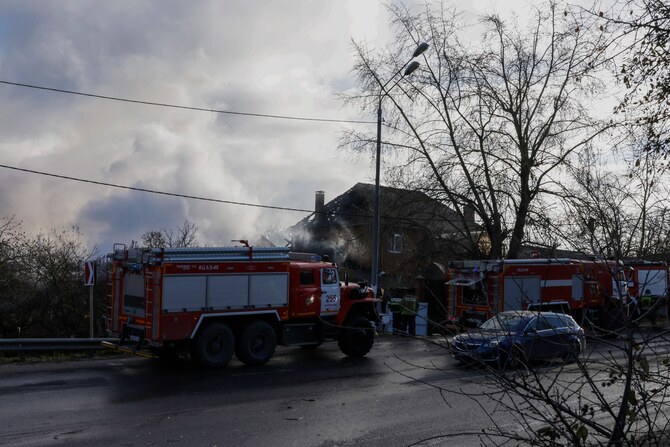MOSCOW: Ukraine attacked Moscow on Sunday with at least 34 drones, the biggest drone strike on the Russian capital since the start of the war in 2022, forcing flights to be diverted from three of the city’s major airports and injuring at least one person.
Russian air defenses destroyed another 36 drones over other regions of Western Russia in three hours on Sunday, the defense ministry said.
“An attempt by the Kyiv regime to carry out a terrorist attack using an airplane-type drones on the territory of the Russian Federation was thwarted,” the ministry said.
Russia’s federal air transport agency said the airports of Domodedovo, Sheremetyevo and Zhukovsky diverted at least 36 flights, but then resumed operations. One person was reported injured in Moscow region.
Moscow and its surrounding region, with a population of at least 21 million people, is one of the biggest metropolitan areas in Europe, alongside Istanbul.
For its part, Russia launched a record 145 drones overnight, Ukraine said. Kyiv said its air defenses downed 62 of those. Ukraine also said it attacked an arsenal in the Bryansk region of Russia, which reported 14 drones had been downed in the region.
Unverified video posted on Russian Telegram channels showed drones buzzing across the skyline.
The 2-1/2-year-old war in Ukraine is entering what some officials say could be its final act after Moscow’s forces advanced at the fastest pace since the early days of the war and Donald Trump was elected 47th president of the United States.
Trump, who takes office in January, said during campaigning that he could bring peace in Ukraine within 24 hours, but has given few details on how he would seek to do this.
When Ukrainian President Volodymyr Zelensky called Trump to congratulate him on his presidential election victory, Tesla CEO and Trump supporter Elon Musk joined the call, according to media reports. Musk owns SpaceX, which provides Starlink satellite communication services that are vital for Ukraine’s defense effort.
Moscow 'Umbrellas'
Kyiv, itself the target of repeated mass drone strikes from Russian forces, has tried to strike back against its vastly larger eastern neighbor with repeated drone strikes against oil refineries, airfields and even the Russian strategic early-warning radar stations.
While the 1,000 km (620 mile) front has largely resembled grinding World War One trench and artillery warfare for much of the war, one of the biggest innovations of the conflict has been drone warfare.
Moscow and Kyiv have both sought to buy and develop new drones, deploy them in innovative ways, and seek new ways to destroy them — from using farmers’ shotguns to advanced electronic jamming systems.
Moscow has developed a series of electronic “umbrellas” over Moscow, with additional advanced internal layers over strategic buildings, and a complex web of air defenses which shoot down the drones before they reach the Kremlin at the heart of the Russian capital.
Both sides have turned cheap commercial drones into deadly weapons while ramping up their own production. Soldiers on both sides have reported the visceral fear of drones — and both sides have used macabre video footage of fatal drone strikes in their propaganda.
Russian President Vladimir Putin, who has sought to insulate Moscow from the grinding rigours of the war, has called Ukrainian drone attacks that target civilian infrastructure such as nuclear power plants “terrorism” and has vowed a response.
Moscow, by far Russia’s richest city, has boomed during the war, buoyed by the biggest defense spending splurge since the Cold War.
There was no sign of panic on Moscow’s boulevards. Muscovites walked their dogs while the bells of the onion-domed Russian Orthodox churches rang out across the capital.


























